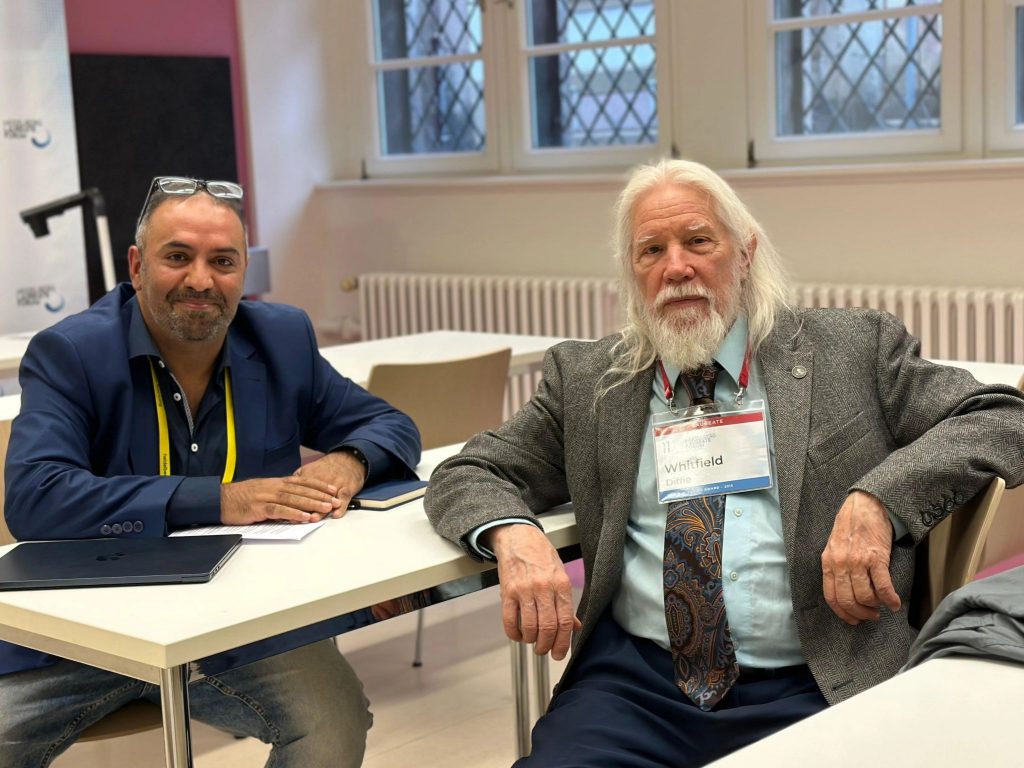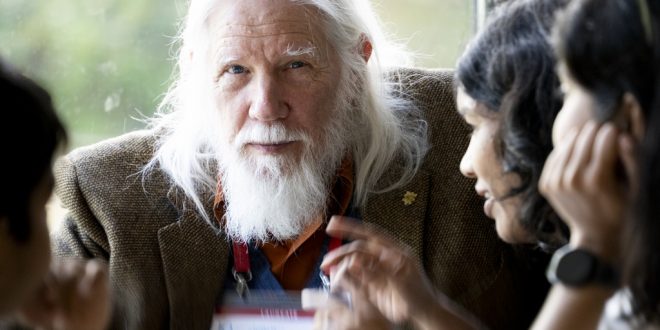Heidelberg, Germany
Exclusive – Yemen Science
By Abdulrahman Abotaleb
لقراءة النسخة العربية من المقابلة
Whitfield Diffie, a name synonymous with the foundations of modern cryptography, forever changed how we secure digital communications, revolutionizing digital signatures and secure key exchange.. A visionary in his field, Diffie co-invented public key cryptography in the 1970s, a breakthrough that paved the way for secure online communication in today’s interconnected world.
Cryptography converts data into unreadable code to protect it, ensuring only authorized users can access it. It plays a vital role in safeguarding sensitive information on the internet, like financial transactions and personal messages, by maintaining data privacy and security.
In 2015, Diffie was awarded the prestigious ACM A.M. Turing Award, along with Martin Hellman, for inventing and promoting asymmetric public-key cryptography. Diffie’s career spans influential roles at MITRE Corporation, Stanford University, and Sun Microsystems, where he served as Chief Security Officer. He also served as a vice president for Information Security and Cryptography at Internet Corporation for Assigned Names and Numbers (ICANN). His contributions to cryptography have earned him numerous honors, solidifying his legacy as a key figure in data security and privacy.
At the 11th Heidelberg Laureate Forum took place from September 22 to 27, 2024, I had the privilege of sitting down with this legendary figure. In our conversation, Diffie shared his insights on cryptography, privacy, and the future of digital security in the face of emerging technologies as well as other challenges and opportunities.
The Interview:

What initially attracted you to the field of cryptography, particularly at a time when it was relatively unknown?
Diffie: What attracted me was my belief that private conversation is essential to a free society. I had been thinking about that since the 1960s, and cryptography was the only technology that could protect individuals under those circumstances.
Were there government restrictions on cryptography research during the 1970s? If so, how did you navigate this environment?
Diffie: There were essentially no regulations in the U.S. against doing cryptography research. The only significant restrictions were in areas related to nuclear weapons. Export control regulations later limited shipping cryptographic equipment abroad, but research publications were protected under free speech laws, so government regulation was never a major problem for me.
When you co-invented public key cryptography, did you foresee its critical role in securing the modern internet?
Diffie: Not really. At the time, I was mostly thinking about secure telephone calls, not the internet. The internet was just starting to emerge, but I was focused on the general phenomenon of secure communications. Interestingly, my late wife mentioned in an interview at RSA that in 1973, I told her that before the century’s end, people would have intimate relationships with others they’d never meet in person. This was the environment I was trying to secure.
If you were to explain the Public Key encryption to a 12-year-old who uses the internet, how would you simplify the concept?
Diffie: It depends on the 12-year-old, but I think many could grasp the idea. I like to describe it as a negotiation in public where both parties can communicate in front of others, yet still agree on something secret that no one else knows.
Do you believe cryptography continues to effectively address today’s security needs?
Diffie: Yes, secure cryptography is indispensable for internet security. It remains the best-developed part of the security landscape, even though implementation and programming are lagging behind.
Looking ahead, especially with advancements in AI and quantum computing, what do you see as the future of encryption and privacy? Are there emerging trends or technologies that concern or encourage you?
Diffie: The future of encryption is heavily influenced by concerns over quantum computing, and in the U.S., we now have new standards to address these challenges. However, the fundamental problems I encountered 50 years ago still exist—there is no adequate mathematical theory of computational complexity, which means there’s no definitive way to determine if cryptographic systems are truly secure.
In your book “Privacy on the Line”, you discuss the balance between privacy and security. With the rise of mass surveillance, how has your perspective on this balance evolved over the past 25 years?
Diffie: I still firmly believe that a free society needs the ability to have conversations that the government cannot overhear.
What are some common misconceptions people have about cryptography and data security?
Diffie: The biggest misconception is that cryptography will protect you from mass surveillance.
How can individuals protect themselves from mass surveillance while remaining active participants in the digital world?
Diffie: The reality is that companies like Google, Facebook and others ask for your information, and people willingly give it to them. That’s the main form of surveillance today, not governments spying on encrypted conversations.
In your opinion, are tech giants that you mentioned doing enough to protect personal data, or are they sacrificing privacy for their business models?
Diffie: I suspect they are sacrificing privacy for their business models, but I can’t say for sure. It seems to me that their entire business is built on user data, primarily for advertising.
Should tech companies be subject to greater regulation regarding data privacy and encryption?
Diffie: I’m not convinced. European privacy regulations, as an example, don’t seem to solve the fundamental problem. The advertising-driven internet is flawed, and what’s really needed is a system for anonymous payment so that people can pay for services online without anyone knowing they did it.
Do you believe “ethical surveillance” is possible? If so, what would the parameters of such a system look like?
Diffie: Surveillance is only ethical if the people being watched don’t mind. Beyond that, I’m not sure what ethical surveillance means.
What ethical responsibilities do cryptographers have when their work is used in both civilian and military contexts?
Diffie: I suppose cryptographers have a responsibility to design the best systems they can, regardless of who their customers are.
With the increasing implementation of data sovereignty laws and data localization policies, do you view these regulations as effective tools for enhancing privacy, or do they present obstacles to global innovation?
Diffie: I’m not sure. It’s a complex issue.
Governments often argue that access to encrypted communications is necessary to combat terrorism, cybercrime, and child exploitation. How do you respond to such arguments? And, do you believe strong encryption can coexist with national security interests?
Diffie: Yes, I believe strong encryption can coexist with national security interests. Many of the proposals that limit encryption violate fundamental freedoms, and often, they don’t even work effectively.
Investigative reports show that authoritarian regimes often purchase surveillance technologies from Western companies. How do you see the sale of such technology from democracies to governments with questionable human rights records?
Diffie: What concerns me most is that these sales may help develop technologies that are later used against citizens in western democracies.
Recently, Lebanon experienced coordinated incidents where telecommunications devices exploded, causing fatalities. Do you believe this could signal the emergence of a new form of cyber warfare?
Diffie: It’s hard to see how this tactic could be repeated quickly. It was a clever weapon to use if you are absolutely desperate, but I’m mystified by that whole thing. I wonder, did any of those devices fly on airplanes? Would they not be detected by surveillance at the airport? It seems like a waste of an innovative strategy, and I think people will be more cautious about the sources of their devices in the future.
During your time at ICANN as Vice President for Information Security and Cryptography, how did your expertise influence ICANN’s security strategies?
Diffie: In truth, my role at ICANN was quite limited. I was there to support Rod Beckstrom, the CEO, on security issues. Although I observed the development of domain name security systems, I did not play a significant role in designing them.
What advice would you give to aspiring cryptographers and computer scientists who are passionate about advancing digital security and privacy?
Diffie: I usually tell young people that security is just one small part of the world. Biotechnology and other fields are likely to have a much bigger impact on the future.
What is your impression of the Heidelberg Laureate Forum (HLF)?
Diffie: The HLF’s primary goal is to connect older scientists with younger generations, and I think that works very well. It is an enjoyable opportunity to reconnect and share ideas in a supportive and wonderful setting. There is also a lot of fun and outstanding hospitality. We appreciate tremendously the wonderful way we are treated here.
 الشبكة اليمنية للعلوم والبيئة (يمن ساينس) موقع يهتم بأخبار العلوم والتكنولوجيا والصحة والبيئة والسكان
الشبكة اليمنية للعلوم والبيئة (يمن ساينس) موقع يهتم بأخبار العلوم والتكنولوجيا والصحة والبيئة والسكان





